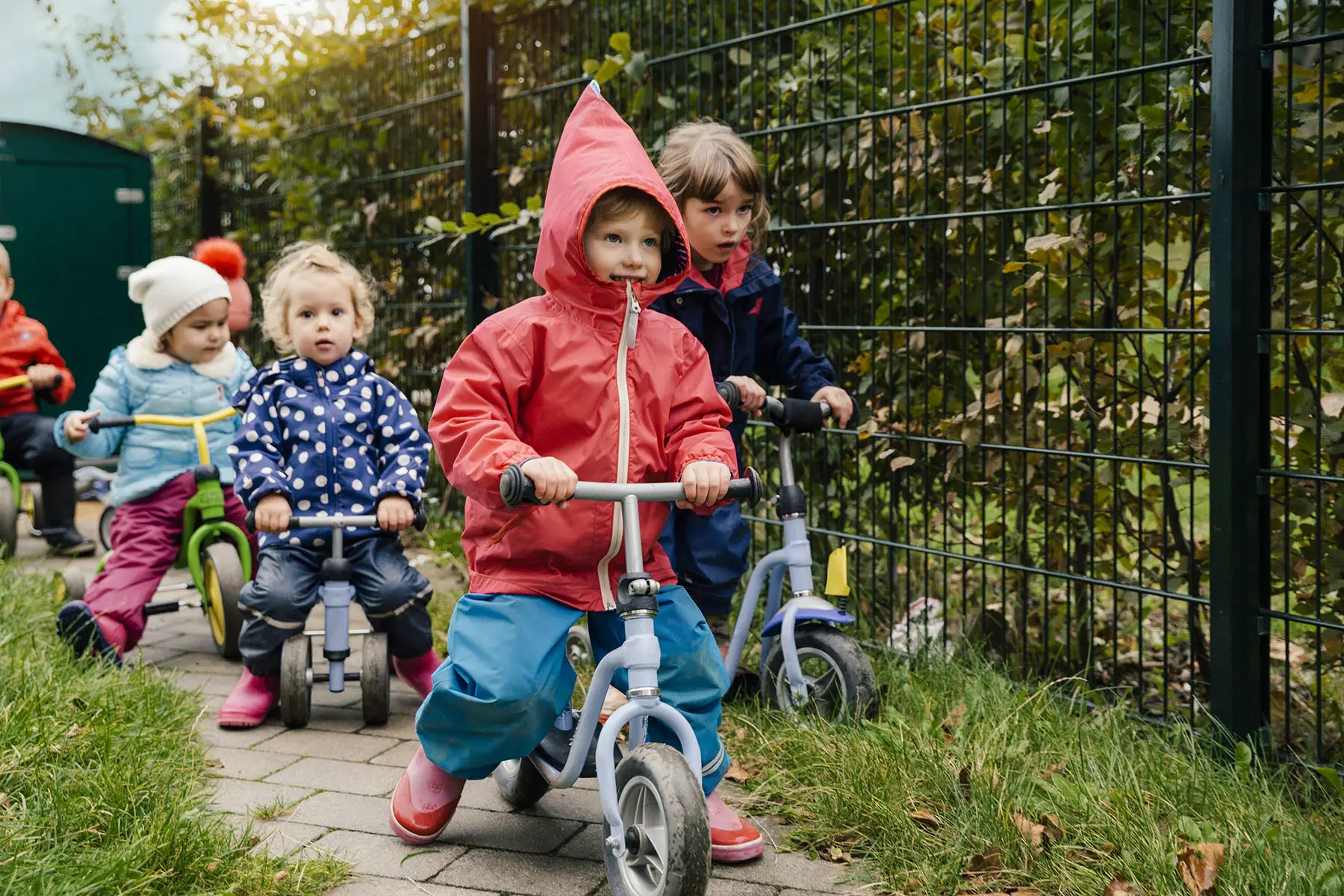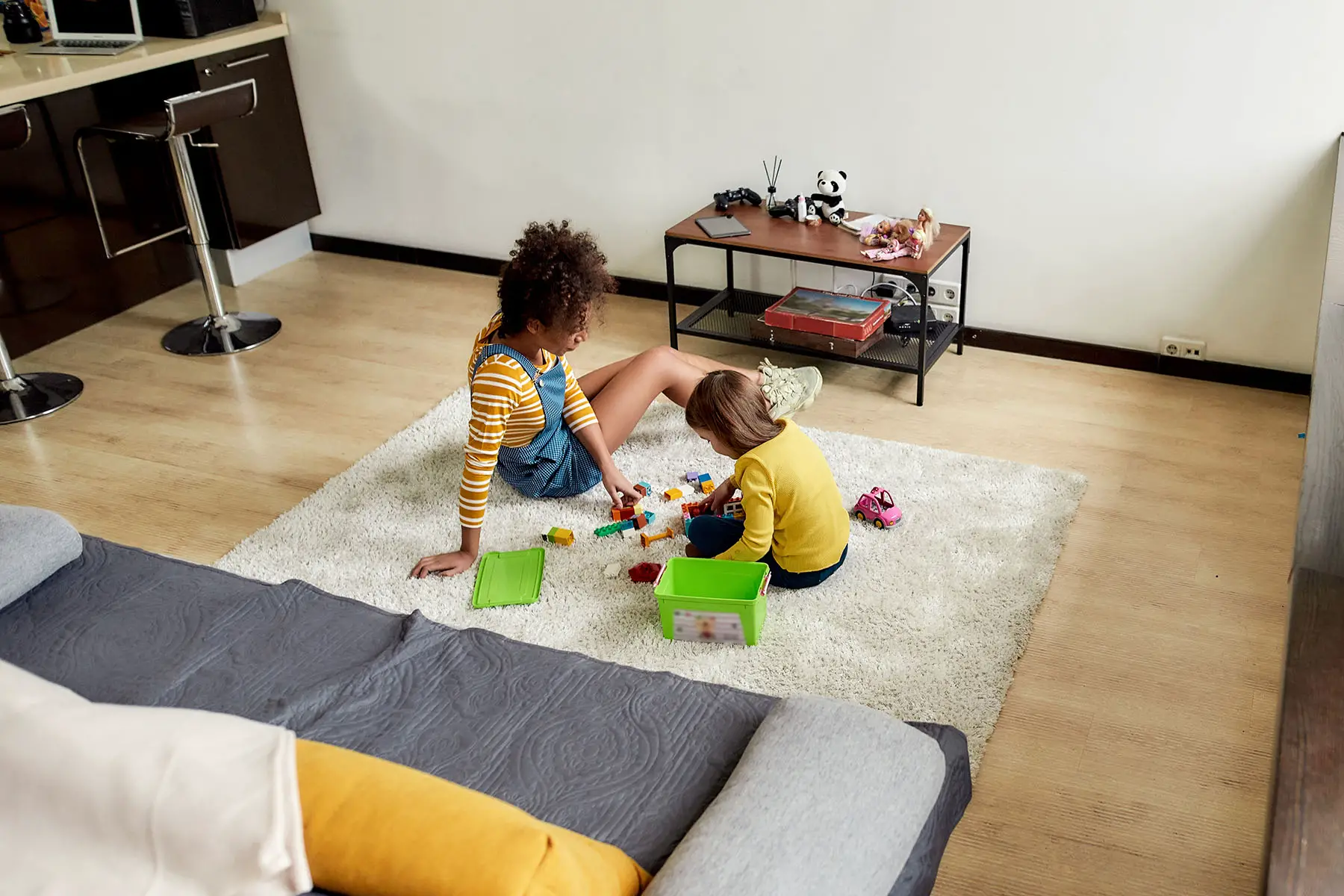If you planning on having a baby or raising a child in Germany, you’ll be pleased to know that there are a wide range of affordable childcare options across the country. Better still, if you are a low-income family, there are plenty of benefits you can claim to help with the costs.
Learn what you need to know about the topic, including:
Overview of childcare in Germany
Over the past couple of decades, childcare in Germany has shifted from informal or in-home care to center-based care. All children now have a legal right to a childcare place from the age of 12 months, partially subsidized by the state.

The main types of German childcare are:
- Nurseries or crèches (Kinderkrippe) – for children aged 0-3
- Preschools (Kindergärten) – for children aged 3-6
- Childminders (Tagespflege) or nannies (Kinderfrau) – for children of all ages
- After-school care (Schulhort) – for primary school children
Nurseries, crèches, and preschools fall under the scope of daycare centers (Kindertagesstätte or KiTa) and take in children from around three months until they start school at the age of six. These centers can be private, public, or non-profit institutions.
On a strategic level, the Federal Ministry for Family Affairs, Senior Citizens, Women and Youth (Bundesministerium für Familie, Senioren, Frauen und Jugend – BMFSFJ) is the central agency responsible for childcare and early years development in Germany. Policy implementation is mostly left to the regional State Youth Welfare Offices (Landesjugendämter) in the 16 different states (Bundesländer).
The federal government plans to support the states with €4 million in 2023-2024 to improve daycare facilities through the Kita Quality Act (KiTa-Qualitätsgesetz).
How does Germany compare internationally?
Although state provision has improved and there is less reliance on informal childcare options, Germany is a below-average performer in many areas globally.
In 2019, it spent 0.25% of its GDP on early childhood education and care, slightly below the OECD average of 0.8%. Around 35.5% of children aged under 3 attended childcare facilities in 2022, much below the OECD average of 75%. This is for an average of 30-35 hours per week. The figure rises to 91.9% of 3-to-5-year-olds attending daycare (compared to an OECD average of at least 90%).
However, things are better in terms of childcare quality. Germany has a high number of preschool staff (just over 1 staff to 10 children) and all early years teaching professionals are educated to at least ISCED 6 (degree-level).
How long is parental leave in Germany?
New mothers are entitled to 14 weeks of paid maternity leave (Mutterschutzgesetz) which is usually taken around six weeks before the birth and eight weeks afterward. Expectant fathers currently have no guaranteed paid time off, except on the day of the birth itself.
This will change from 2024 onward when fathers will automatically get two weeks of paid paternity leave (Vaterschaftsurlaub).
Who can access childcare in Germany?
All children of legal residents in Germany can access childcare and have a guaranteed daycare placement from the age of 12 months. Keep in mind, however, that some facilities can fill up more quickly than others, so it’s advisable to start applying early.

Your child must be vaccinated against measles to get into daycare. Parents who refuse to vaccinate their children can face fines of up to €2,500. Other vaccinations are not compulsory but are strongly recommended by German healthcare authorities.
What childcare options are available in Germany?
German preschool and daycare
In recent years, the government has put in millions of funding to improve the standards of childcare. There are now around 59,300 daycare centers across the country, with around one-third run by the public sector.
Nurseries or crèches (Kinderkrippe)
You can take your child to a nursery or crèche from as early as three months old. These are run by either the state, private companies or individuals, or voluntary groups (e.g., churches). Most centers will charge a fee, and there is only a limited childcare allowance available for this type of care.
Activities are largely informal and are aimed at developing children’s social and interactive skills. Daycare sessions generally run from around 07:00 or 08:00 and can finish anywhere between 13:00 and 17:00.
Preschools (Kindergärten)
Children aged 3-6 can go to a Kindergarten. Although it is not compulsory, over 90% of German children enroll in preschool education. Sessions are more formalized than at Kinderkrippe, with some lessons taught by qualified educators.
Preschools can be run by private, public, or non-profit organizations, although public schools are more widely available.
Sessions typically start at around 07:00 or 08:00 and finish around 17:00 or 18:00.
International daycare
Of course, most of the daycare in Germany is provided in German. If you want to find a daycare that speaks a foreign language (i.e., a bilingual or multilingual preschool), be prepared to pay higher fees. Many of the international schools in Germany have preschool facilities and take children from the age of two or three. You can also check for international providers in your federal state.
Alternative daycare
Germany has a number of alternative preschools and daycare centers that focus on different learning methods and techniques. For example, Waldorf and Montessori schools place a greater emphasis on outdoor play or pupil-led learning.

As with international daycare, fees are typically higher although there are some that offer bursaries for low-income families.
Professional childminders in Germany
Childminders
Childminders in Germany are officially known by the gender-neutral term Tagespflege, although they are often still referred to as Tagesmütter (literally translated to day mother) or Tagesväter (day father). These childminders typically provide childcare in their own home for one or a small number of children that can be of any age up to around 12 or 13.
The advantage of using a childminder is that they are usually more flexible than daycare centers in terms of availability. In some instances, they also work evenings and weekends. Drawbacks include that you’re reliant on them as individuals, meaning that you have to look for alternative cover if they fall ill or suddenly become unavailable.
Each childminder needs to register with the State Youth Welfare Office. They typically work alone but some get together and work in groups (Großtagespflege).
Nannies
A professional nanny (Kinderfrau) is someone who provides childcare in your home. Many nannies live with the family they work for and will work a full-time week (40 hours). Duties usually include meal preparations, washing, and bedtime duties.
Similar to childminders, nannies can provide their services to children of all ages (although they are typically used for younger children). Many nannies come from abroad and have foreign childcare qualifications. If you take on a nanny, you will be their employer and will be expected to deal with their tax, health insurance, and social security arrangements.
Au pairs
Au pairs are a more affordable form of home-based childcare than nannies but are typically less qualified. They’re usually young persons from overseas looking to have a cultural learning experience abroad. Au pairs typically live with the family while providing a range of duties, including some childcare, for around 30 hours a week.

Au pairs aren’t classified as employees so you won’t need to make any tax or social security arrangements. You just need to pay a weekly or monthly allowance (i.e., pocket money), and provide accommodation. In some cases, you may also need to cover health insurance and German language lesson costs.
You can find more information on the website of the Federal Employment Agency (Bundesagentur für Arbeit).
Babysitters
Babysitters are typically an informal and ad-hoc form of childcare that you employ when you have one-off appointments or want a night out. They can fall anywhere on the spectrum from a teenager to a retired professional. Many people will call on friends or neighbors for babysitting duties. However, you can also search online through childcare websites or social media groups. Payment is usually agreed upon as an hourly rate beforehand and settled in cash afterward.
Childcare provided by an employer
In Germany, employers are not obliged to provide childcare facilities or allowances. However, some large organizations and multinational companies may offer either on-site crèches or childcare support. The BMFSFJ has set up a program of company childcare (Betriebliche Kinderbetreuung) to encourage employers to provide daycare places. You can ask your employer about their policy on childcare support if you need assistance.
If you have to take time off work to look after a sick child, your employer must pay child sickness benefits (Kinderkrankengeld). The statutory entitlement is a maximum of 30 days per year per child and 65 days per year in total. This is slightly higher for single parents. Many employers have their own schemes and may pay out higher amounts for longer periods. If your employer doesn’t have a scheme, the government will cover the basic amount through statutory health insurance.
Community-based childcare schemes
Parent initiatives (Elterninitiative) are childcare groups that are managed by the parents themselves. According to the Federal Association of Parents’ Initiatives (Bundesarbeitsgemeinschaft Elterninitiativen – BAGE), there are currently (2023) over 7,500 parent initiatives across Germany looking after more than 200,000 children.
These groups are typically smaller than standard daycare centers and involve parents participating in the operation, maintenance, and administration of the group. In some cases, experienced and qualified childcare workers and educational staff can run the actual classes.
Childcare for school-age children
German before- and after-school clubs
Usually, only primary school children attend on-site school clubs (Schulhort or Hort), but some are also available for secondary school children. Horts are typically available before school from 07:00 and after school until around 18:00. They normally involve arts and sports activities, do homework, and provide meals such as breakfasts and snacks.

Horte are typically organized by individual schools, although some local Kita or other youth services may deliver provision. Costs vary across regions and individual schools. Factors affecting costs include the number of hours provided, services offered (e.g., meals), and level of demand. Parents on low incomes can usually get support to cover at least some of the costs.
Only around 20% of German primary school-age children attended out-of-ours childcare services in 2022, according to figures by the Organization for Economic Cooperation and Development (OECD). This is below OECD average, as well as the European Union (EU) average.
Childcare in Germany during school holidays
If you need to find childcare for school children during the school holidays, many of the after school clubs also have holiday camps that includes a range of fun and educational activities. They are usually aimed at primary school children but some offer activities for children up to 14, or sometimes even 16. You can check with your local State Youth Welfare Office to see what is available.
For older children, there are many summer camps and language camps suitable for those aged 10-18. For example, Camp Adventure arranges sports and language camps during the summer. You can find more holiday camps in Germany on the World Camps website.
How to find childcare in Germany
If you are looking for childcare in Germany, your first place of contact should be the local State Youth Welfare Office. They can help you find and book a place at a public Kita. The offices usually also have information on other local daycare facilities, as well as details of childminders in the area.
Other useful resources for finding childcare in Germany include:
- Au Pair World – find a suitable au pair in Germany
- Betreut – discover a range of different providers
- Hallo Babysitter – search engine for local childminders and babysitters
- Familie und Tipps – find information on different kita models
- Kindergarten Vergleich – look for daycare provisions in your state
- Kita.de – you can search for nurseries and preschools in your area
- Kinderstaff – find private nannies working in Germany
There are several factors you might want to consider when choosing a daycare service in Germany, including location, costs, level of provision, and activity schedule.

Once you’ve found a place you like, it’s a good idea to visit them beforehand to gauge their suitability. When you enroll your child, you’ll typically need to provide their ID and address plus a medical certificate containing vaccination information.
When booking a placement with a daycare center, it’s advisable to start early (maybe up to a year in advance). That is because some centers fill up early and end up with a waiting list.
How much does childcare cost in Germany?
Germany is one of the most affordable countries when it comes to childcare. According to OECD statistics, it’s the cheapest country in the EU for daycare in terms of percentage of salary. Parents with two children aged 2-3 using full-time daycare pay only 1% of their salary on costs.
That said, costs can vary hugely and depend on a variety of factors, including region, type of care, scope of care, family income, and number of children. Public provision is usually cheaper than private care and the different German states have different policies on costs. Some states (e.g., Berlin and Hamburg) even offer free public daycare. Parents only pay for extras such as meals and refreshments.
Typical childcare costs in Germany are:
- Daycare – between €15-400 a month for state daycare, averaging at around €169 per month. Private care is more expensive and can be as much as around €1,000 a month.
- Childminders – typically between €5-15 an hour (so can be around €800 a month for a 20-hour week)
- Nannies – average salary of €1,540 a month, plus employer contributions
- Au pairs – €260 a month plus accommodation, health insurance, and language class fees for a 30-hour week
- Babysitters – typically between €2-15 per hour
Child benefits and childcare allowance
All families that have been legal residents for more than six months can access child benefits (Kindergeld). This money usually goes towards the costs of all children aged up to 18, or up to 21 if unemployed, and up to 25 if still in education. The amount is currently €219 a month for the first two children, €225 a month for a third child, and €250 a month for any subsequent children.
Parents are also entitled to a parental allowance (Elterngeld) of around 65% of their salary, up to a maximum of €1,800 a month. This can be for up to 14 months in total.

In addition, the government has introduced:
- Maintenance Advance (Unterhaltsvorschuss) – extra support for children who don’t receive maintenance payments (i.e., child support)
- Parental Allowance Plus (ElterngeldPlus) – further support to help parents who want to return to work part-time after the initial parent allowance period runs out
- Partnership Bonus (Partnerschaftsbonus) – four additional months of the Parental Allowance Plus payment if both parents work part-time for a period of four months. Note: You can also apply for the bonus if you are a single parent
- Better flexible working hours – up to 24 months of unclaimed parental leave that parents can take between the child’s third and eighth birthday
You can find more information on childcare allowances and benefits in Germany on the BMFSFJ website.
Childcare allowance for low-income families
If you are below a certain income threshold, you can also apply for:
- Daycare subsidy/vouchers (Kita-Gutschein) – funding available for daycare through your local Youth Welfare Office (in German); amounts vary across German states and depend on income levels
- Child Benefit Supplement (Kinderzuschlag) – up to €229 a month per child to supplement child benefit payments for low-earning families
- Tax-free child allowance (Kinderfreibetrag) – tax allowances of up to €8,388 per year for each household to support the costs of raising and caring for children
Check the BMFSFJ family portal for benefits calculators and information on family benefits.
What if my child needs healthcare in Germany?
You can pay for your child’s healthcare in Germany by taking out either public or private health insurance. The country has a great quality public healthcare system, with children having access to pediatricians, dentists, and other medical care.
Mind that you register your child with a family doctor first; they will act as the first point of contact and can refer for specialist care if necessary.
How to become a childcarer in Germany?
If you want to become a child carer or set up a child-caring service in Germany, you must get a relevant license from your local State Youth Welfare Office. You will also need to complete any necessary training (e.g., child first aid training).
You must also decide whether to run it as a private business, a non-profit, or perhaps an Elterninitiative. Another option is to set up a public Kita, and thus take employment from the State Youth Welfare Office directly.
You’ll typically need:
- A medical certificate
- A certificate of conduct (Führungszeugnis)
- Undergo a home inspection from local authorities (in the case of childminders)
Useful resources
- BMFSFJ – website of the central government body responsible for childcare in Germany
- Familie und Tipps – web portal with information on a range of topics relating to children and families in Germany
- Kita.de – search engine for nurseries and preschools in your area
- State Youth Welfare Office – website of regional authorities on matters relating to childcare in Germany








